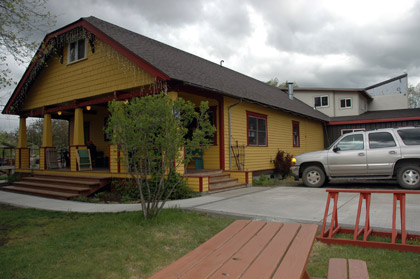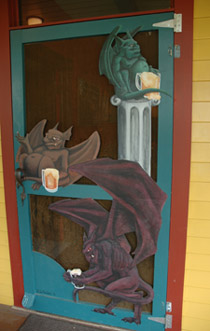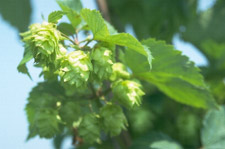
Peek behind the curtain and you’ll see Terminal Gravity Brewing in Northeast Oregon is bursting at its micro-seems, but you aren’t required to look. The pleasure here is, well, right here.
Every seat inside the pub-restaurant was taken within half an hour after it opened Saturday, although that only amounted to about two score customers. When a damp, chilling wind isn’t blowing there’s more outdoor seating at picnic tables or on the front porch than inside.
 Steve Carper and Dean Duquette built the place themselves – including fabricating the brewing equipment – in 1997. When it opened, they leased space to a baker and built a USDA-approved sausage kitchen. “We’re the brewer, the baker and the sausage maker,” Duquette said at the time.
Steve Carper and Dean Duquette built the place themselves – including fabricating the brewing equipment – in 1997. When it opened, they leased space to a baker and built a USDA-approved sausage kitchen. “We’re the brewer, the baker and the sausage maker,” Duquette said at the time.
The house that was the brewing operation is now surrounded in back and off to the side by a growing brewery.
Demand obviously comes from farther than the pleasant village of Enterprise (population 2020) or from tourists traveling to Lake Wallowa and the Hells Canyon recreation area. From the time the Horse Brass Pub in Portland put Terminal Gravity IPA on tap it’s been one of Oregon’s defining IPAs.
But the business of beer wasn’t a thought for three generations of a family occupying what feels like a living room upstairs — they sat in two couches, two easy chairs and the patriarch on the coffee table. They were talking about hiking and other outdoor activities.
We ate beside the foosball game (Sierra reigned there), on a wooden table built for card games. Sierra had macaroni and cheese, Daria ate a salmon sandwich and I enjoyed the pesto pasta. All were excellent. The beers share a certain similarity — like the grapefruity IPA they are generally a bit chewy. That didn’t serve the seasonal tripel as well as it did the breakfast porter (roasted nuts, coffee and cream, wonderful texture).
The beers are good enough to drive all the expansion going on in back, but they aren’t going to taste as good anywhere else as they do here.

 Steve Carper and Dean Duquette built the place themselves – including fabricating the brewing equipment – in 1997. When it opened, they leased space to a baker and built a USDA-approved sausage kitchen. “We’re the brewer, the baker and the sausage maker,” Duquette said at the time.
Steve Carper and Dean Duquette built the place themselves – including fabricating the brewing equipment – in 1997. When it opened, they leased space to a baker and built a USDA-approved sausage kitchen. “We’re the brewer, the baker and the sausage maker,” Duquette said at the time. Those are Michigan hops on the right.
Those are Michigan hops on the right.